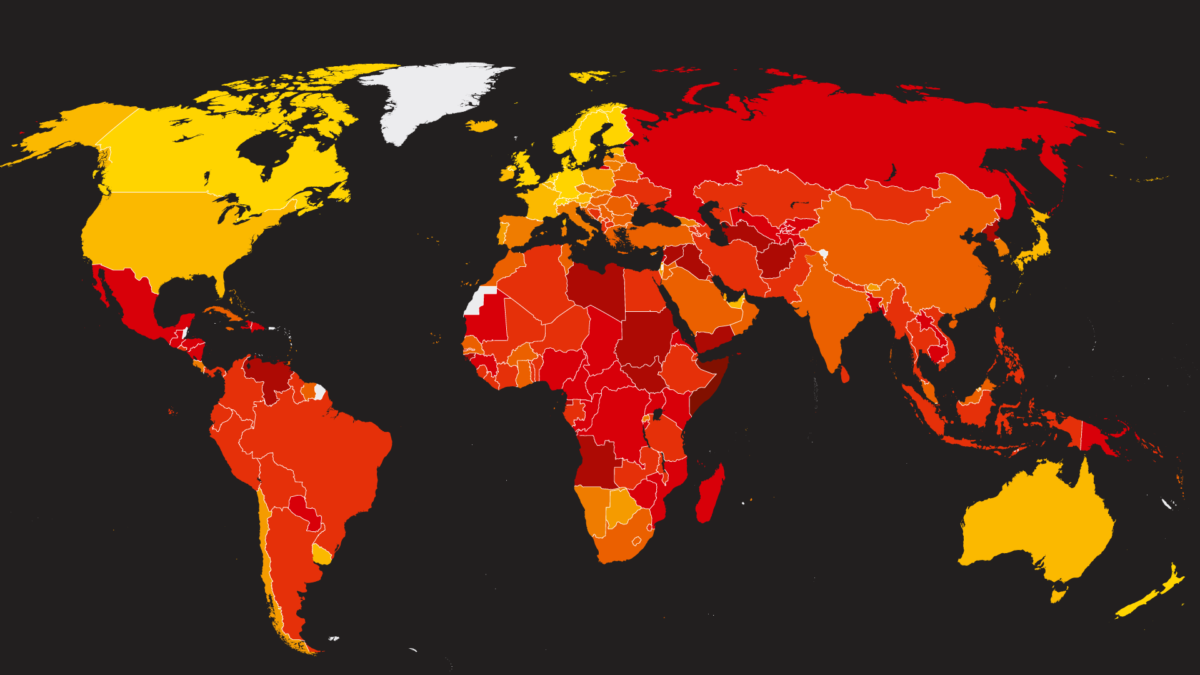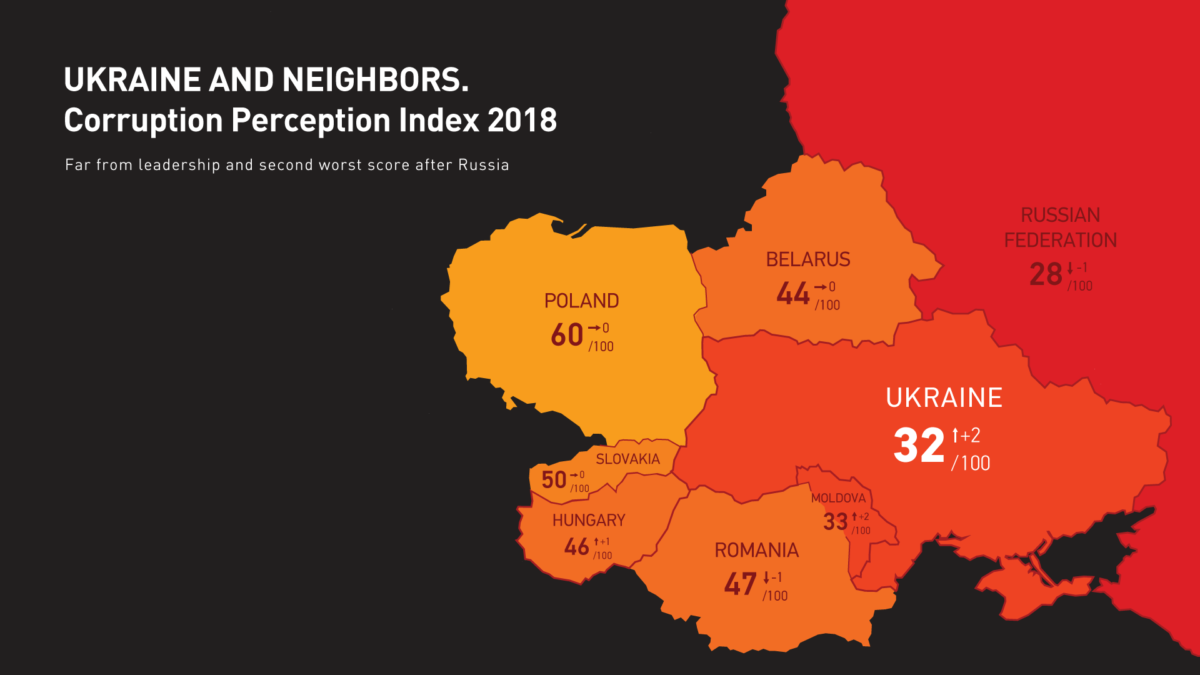

The global anti-corruption organization Transparency International has published Corruption Perceptions Index 2018. Ukraine has somewhat improved its score. It received 32 points, ranking 120th among 180 countries. This result is 2 points and 10 places higher than in 2017 (when Ukraine ranked 130th with 30 points).
Interactive Infographic
Among its neighbors, Ukraine’s score is better only than that of Russia (28 points, rank 138). The others have higher scores: Poland – 60, Slovakia – 50, Romania – 47, Hungary – 46, Belarus – 44, Moldova – 33 points.

Ukraine’s score has grown, among other things, thanks to a more positive assessment made by businesspeople, according to the research by which the index is informed. Automated VAT refunds, activity of the business ombudsman and extended functioning of the electronic systems ProZorro and ProZorro.Sale may have all contributed to this fact.
Transparency International Ukraine point out that the government has partially implemented its 2018 recommendations concerning creation of the High Anti-Corruption Court. Ukraine has adopted the legislative framework, however, the full-scale launch of the court itself has been postponed to 2019.
However, most recommendations were disregarded by the authorities.
The Ukrainian government did not adhere to the recommendation to give the public more authority in potential judge verification process. Conclusions about candidates made the Public Integrity Council were disregarded by the High Qualification Commission of Judges on numerous occasions.
The powers of the National Anti-Corruption Bureau did not increase either. NABU detectives were not yet granted the right to independent wiretapping. Legislative changes further complicated forensic reviews in criminal proceedings (the infamous “Lozovyi’s amendments”).
Instead of putting a stop to the counterproductive public conflict between law enforcement agencies, Ukraine witnessed its aggravation.
Pressure against activists and journalists intensified. A frightening example of this tendency was the murder of activist Kateryna Handziuk.
Reboot of the National Agency for Corruption Prevention was not facilitated or assisted in any way. The discredited agency continues to be unable to perform its function in the anti-corruption infrastructure effectively.
The announced automatic e-declaration verification is practically useless, because the NACP has not yet obtained access to certain public registers. The NACP did not become the technical administrator of the e-declarations register. The tender for the Agency’s audit was held with legislative violations.
The Security Service of Ukraine and the National Police retained the function of economic crime prevention. Law enforcement bodies continued to put business under significant pressure. Financial Investigation Service was not created.
It becomes apparent that the progress of the recent years has been based on the reforms initiated back in 2014. However, one of the main obstacles of the anti-corruption improvement is the lack of political will.
Transparency International Ukraine has developed recommendations for the Ukrainian authorities for 2019. They should help to improve Ukraine’s CPI score significantly. While there are two election campaigns taking place in 2019, which decreases the this year’s reform potential, we recommend that the authorities take the following measures:
In the sector of corruption prevention:
Reboot the NACP
The Verkhovna Rada should adopt a law allowing to select new personnel of the National Agency for Corruption Prevention. The process should involve independent international experts. The new model of the NACP’s operation should reject the principle of collective leadership as ineffective. The Agency should undergo external audit.
Implement comprehensive automatic verification of declarations and monitoring of filers’ lifestyles
The owner of the electronic declaration register should be granted access to some necessary state databases. Automatic verification of declarations, especially those of high-ranking officials, should work properly. Monitoring of public officials’ lifestyles should be implemented.
Ensure effective work of the beneficial ownership register
An open mechanism should be implemented to verify information on beneficial owners of economic entities.
Continue the public procurement reform
Legislative changes should be adopted which would improve the work of the electronic public procurement system ProZorro. Effective monitoring and verification of public procurement by the State Audit Service of Ukraine should be ensured.
Transfer government-owned enterprises to private ownership
To reduce the influence of oligarchs’ business on the public sector, privatization and corporatization processes need to be accelerated. Assets of bankrupt enterprises should be sold efficiently through transparent electronic auctions. Such auctions should also be used to sell expired loans of national banks.
Enhance oversight of political party funding
Legislation regulating political advertising to restrict its scope should be improved. Sanctions for violations of the electoral legislation should be increased. Electronic public reporting of parties on their funding should be implemented alongside the verification mechanisms for such reports.
In the sector of punishment for corruption:
Change the way judicial authorities are appointed
A new appointment procedure should be introduced for the High Qualification Commission of Judges and the High Council of Justice. In addition to that, the influence of political actors and judicial personnel on this process should be restricted. It should engage the public and international experts.
Restore credibility of the Anti-Corruption Prosecutor’s Office
The SAPO’s reputation, damaged when information was published about a proceeding involving the agency’s head. If the management were to be replaced, the competition should be held transparently and under a new procedure.
Broaden the mandate of the National Anti-Corruption Bureau
Recommendation given by Transparency International Ukraine in 2018 should be implemented: the NABU’s powers must be extended. Among other things, legislation should be adopted providing for independent wiretapping and access to other protected information for NABU detectives without SBU involvement.
Deprive the Security Service of Ukraine and the National Police of powers in the sector of economic crime prevention
Last year’s recommendation of Transparency International Ukraine should be implemented: the law “On the Security Service of Ukraine” should be amended and the provisions enabling the Service to pressure businesses under the pretext of economic crime prevention should be eliminated. Other law enforcement agencies, too, should be stripped of similar powers. Instead, the Financial Investigation Service should be created.
In the sector of public engagement in anti-corruption activity:
Punish instigators of attacks against anti-corruption activists
Investigation of attacks and pressure against anti-corruption civil society activists and investigative journalists working on the subject must be conducted effectively. Instigators should be identified and case files must be sent to court.
Abolish the provisions on electronic declarations for anti-corruption activists
Legislation must be developed and adopted to abolish the obligation of anti-corruption activists and staff members of anti-corruption civil society organizations to declare their assets.
Implement mechanisms of business and public engagement in public administration on a broad scale
The practice of open budget implementation and formation of supervisory boards at state-owned and municipal enterprises should become more common.
***
For reference. Corruption Perceptions Index (CPI) is an index compiled annually since 1995 by the global organization Transparency International. The organization itself does not conduct any surveys, instead relying upon 13 surveys and assessments of reputable international organizations and think tanks. Ukraine’s score is based on 9 sources (Global Insight Country Risk Ratings; World Economic Forum Executive Opinion Survey; IMD World Competitiveness Center World Competitiveness Yearbook Executive, Opinion Survey; The PRS Group International Country Risk Guide; Economist Intelligence Unit Country Risk Ratings; Freedom House Nations in Transit; Bertelsmann Stiftung Transformation Inde; World Justice Project Rule of Law Index Expert Survey; Varieties of Democracy). The key part of the index is not the rank, but the score. The minimum score (0 points) would mean that corruption effectively replaces the government, while the maximum score (100 points) would mean near complete absence of corruption. The index only assesses corruption in the public sector. Since 2012 (when Transparency International started using the current methodology), Ukraine scored worst in 2013, with 25 points. Since 2014, Ukraine’s results have been gradually improving.






